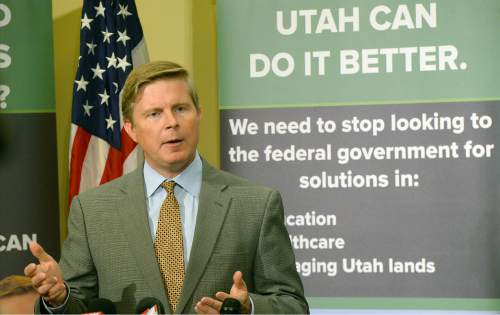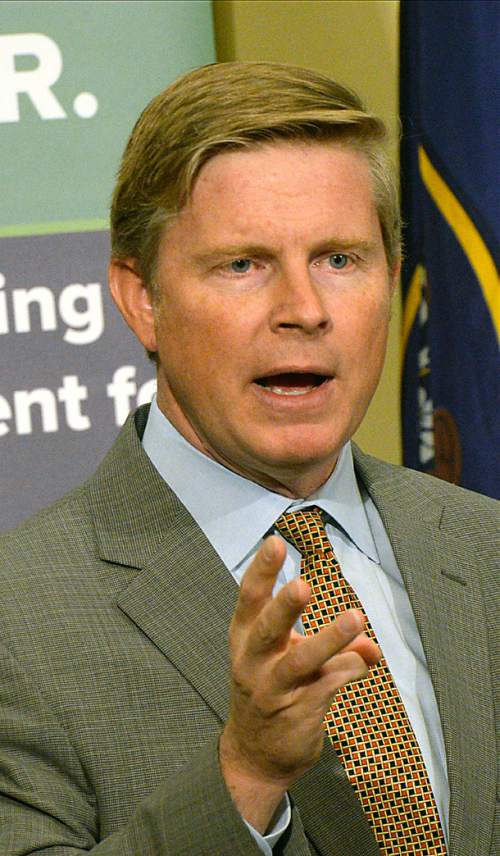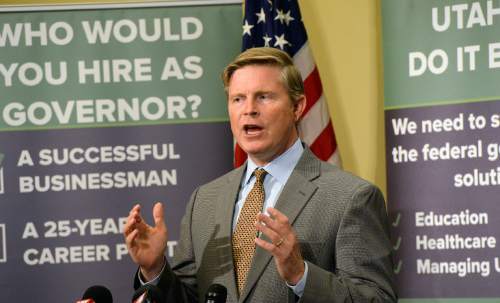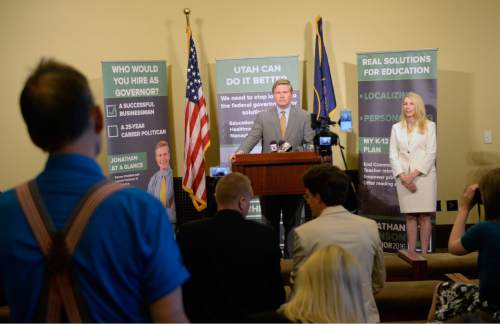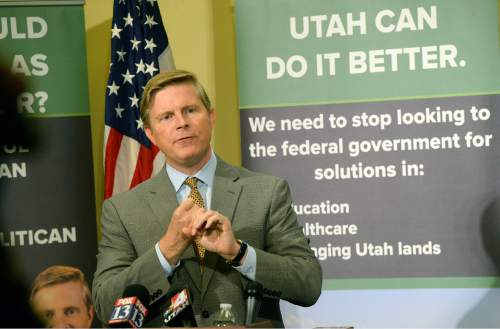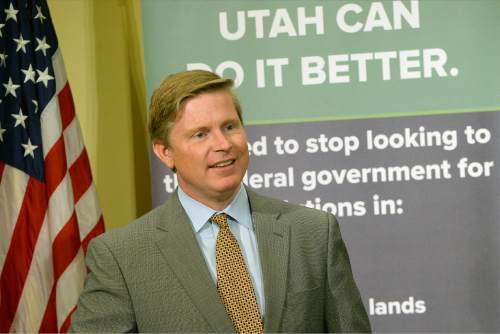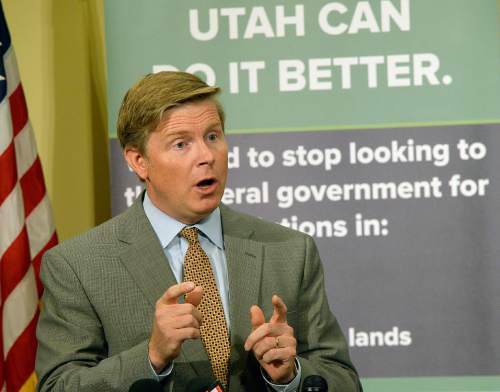This is an archived article that was published on sltrib.com in 2016, and information in the article may be outdated. It is provided only for personal research purposes and may not be reprinted.
Republican gubernatorial challenger Jonathan Johnson laid out a broad agenda for his first 100 days in office — if he is elected — including suing the federal government over public lands, creating a new state inspector general and revamping the Utah Transit Authority governing board.
"There's much that we can do better as Utahns. I'm ready to do something," Johnson said in a news conference Thursday.
Johnson said UTA's 15-member board needs to be replaced with a slimmed-down, elected board.
"They have lost the public trust, and rightly so," Johnson said during a news conference Thursday. "We should have a small board. We should have a board that's elected by the taxpayers so that they're accountable to the taxpayers. Only then will they re-earn the public trust of Utah."
Gov. Gary Herbert's campaign dismissed Johnson's 100-day plan as policy retreads and wishful thinking.
"His outline is a mixture of things the governor has already done, things that aren't the purview of the governor and things he cannot do without legislative support," campaign manager Marty Carpenter said. "It's disingenuous to spend the last six months trashing the governor and then to come out with a plan with only five days to go. Governor Herbert has a plan and has a proven record of getting results."
Johnson's 100-Day Plan, of course, presumes he will beat Herbert in Tuesday's primary and go on to defeat the Democratic nominee, Mike Weinholtz, in November.
Mail-in ballots are being returned to county clerks' offices in 20 of 29 counties and Republican voters will go to their polling places Tuesday to pick the party's nominee. Recent polls have shown Herbert holding a huge lead over Johnson, although the Johnson campaign says the polls are wrong and the race is winnable.
Johnson said he doesn't believe the race has already been decided by the mail-in votes and he plans to sprint to the finish line.
Johnson said that he would file a lawsuit demanding the federal government turn over more than 30 million acres of public land to Utah's control. Johnson wants to push ahead, even though some proponents of the litigation, most notably Rep. Mike Noel, R-Kanab, have said that if HIllary Clinton wins the presidential election in November and appoints a liberal Supreme Court justice, the lawsuit may have to wait.
"It's not a loser. It's a winner," Johnson said, pointing to a legal analysis done last year for the Commission for the Stewardship of Public Lands, a legislative committee exploring litigation.
Johnson said there are three possible outcomes: The most likely outcome, he said, was the state wins the lawsuit; the second was the lawsuit creates leverage to pass Rep. Rob Bishop and Rep. Jason Chaffetz's Public Lands Initiative, which would resolve disputes over 18 million acres in Utah; and the third is the state loses "and we're a little lighter in the wallet."
Johnson said he has asked for, but not been given, a confidential portion of the legal analysis that is believed to outline weaknesses in the state's case. The commission leaders have refused to release it to Johnson, as well as to Democrats on the commission, citing attorney-client privilege.
The cost of the lawsuit has been projected at $14 million. Herbert has said he wants to wait on a lawsuit to give the Public Lands Initiative a chance to pass and believes that, if Utah sues the Obama administration, it would provoke the president to designate a 1.9 million-acre Bears Ears National Monument in southeastern Utah.
Johnson said he would create a new office of inspector general to investigate citizen complaints of government corruption. Currently, such complaints can be investigated by the state auditor, the legislative auditor, the attorney general's office public corruption unit, or the legislative or executive ethics offices.
Johnson said he envisions consolidating some of those investigative functions under the new inspector general.
He would use his business contacts to bring more jobs to Utah, he said, but at the same time would scale back the practice of "picking winners and losers" and giving tax breaks to encourage out-of-state companies to create jobs in Utah. When he was president of Overstock, Johnson sought and received tax breaks for the company to build a new office campus.
Now, he said, the tax breaks last too long and the money would be better used to reduce the corporate tax rate.
If he is elected, Johnson reiterated his promise to get rid of the state Common Core education standards and SAGE testing, create education savings accounts to help parents send children to private schools, reimburse teachers for classroom supplies they buy out of their pocket, and to reduce administrative costs at the state Office of Education — which is the fifth lowest in the country — to get more money to the classrooms. He said he would repeal the Count My Vote compromise in SB54 that created a signature-gathering path to the ballot, saying it neglects rural Utah; he would repeal burdensome laws and eliminate unnecessary state licenses; and he said he would push for a law and a constitutional amendment limiting the governor to two terms.
gehrke@sltrib.com Twitter: @RobertGehrke


